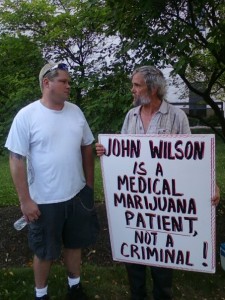
John Wilson (left) stand with supporter Jim Miller in front of the Somerset courthouse in 2010
8/9/2011 – John Ray Wilson is saying goodbye to his family. The 38 year old man lives with multiple sclerosis and without healthcare. Last month an appellate court ruled to uphold his 2010 conviction for “manufacturing” marijuana. He is now living in limbo as a judge considers his bail during a final appeal to the state Supreme Court. John may have to begin serving a 5-year prison sentence any day.
Wilson grew seventeen cannabis plants in the backyard of his Franklin Township home. This was an effort to treat his condition. His trial in 2009/2010 took place at the same time as the final debates over the compassionate use act in the NJ legislature. Supporters demonstrated in front of the Somerville Courthouse. But the law was too late for John Wilson.
John was never allowed to mention that he had MS or that he was growing for his own medical necessity. The state threw every heavy book they had at him. They attempted to convict on the first degree felony of “Operating and Maintaining a Controlled Dangerous Substance Manufacturing Facility.” This was a law designed for crack, meth and heroine processing mainly in urban environments. A first degree felony would carry a mandatory minimum of 15 years in prison.
Multiple sclerosis is one of the few approved conditions under the NJ medical marijuana law. Dr. Denis Petro, a neurologist who testified before the legislature, was ready to offer expert testimony at Wilson’s trial about the unique benefits of cannabis on MS. But Petro and other experts were never allowed.
Medical quality marijuana is expensive on the underground market, $300-$500 per ounce. Home cultivation by medical marijuana patients is allowed in 14 of the 16 states with compassionate use laws. It is certainly a safe and economical way to find relief. Unless a helicopter comes hovering over.
When the NJ State Police Marijuana Eradication Unit arrived at his residence John was up front with officers and detectives. When they were called to the stand, the NJ State Police officers could not recall those conversations in the hours they spent sitting with John at a picnic table in his backyard.
I was in the courtroom the day John took the stand in his own defense. There was significant media attention on the trial from television and newspapers. The jury may have been aware of the reporters or the medical marijuana demonstrators holding signs in front of the courthouse each day. On December 17, 2009 the jury heard MS mentioned officially in the trial for the first time. Here’s my report from that day:
It was honest and sincere; it was the truth. On the stand in his own defense, John Wilson was allowed to tell the jury that he has Multiple Sclerosis.
“I told them I was not a drug dealer and I was using the marijuana to treat my MS.” John had been asked what he said to the State Police officers who arrived to investigate the 17 cannabis plants spotted by helicopter.
It seems Wilson has been truthful with law enforcement authorities about his intentions regarding the medical use of his marijuana from their first contact with him.
NBC 4 in NY was in the courtroom and correctly called the single-sentence event a “Stunning Reversal at Medical Marijuana Trial.” read full
In the end John was convicted on the second-degree felony of “manufacturing marijuana” as well as a third-degree felony for less than gram of psilocybin.
He was taken into custody for five weeks last spring, but was since allowed to remain with his family on bail. His appeal stated that he grew the cannabis for personal use. Under New Jersey law marijuana possession cases can often have the distribution charges removed if the person claims all of the pot was for personal use.
John Wilson stands among supporters signs in front of the courthouse 12/2010
Because of the archaic terminology of “manufacturing” applied to cultivating marijuana, the appellate court ruled there could be no “personal use” defense applied.
The next step is an appeal to the NJ Supreme Court.
NJ Senators Raymond Lesniak and Nicholas Scutari both called on then-Governor Jon Corzine to pardon Wilson but to no avail. A similar petition will be made to Governor Chris Christie.
Like millions of working class Americans the Wilson family is struggling with a variety of serious health care costs.
John’s younger brother Kenny is a developmentally disabled adult bound to a wheelchair. His grandmother endures the many burdens of aging. Even with the MS, John is still the healthier one and spends his days helping his family. Working from home on an eBay store with his mom, John tries to make ends meet.
On the other side of his prison sentence Wilson hopes to be part of New Jersey’s medical marijuana program. But he may still face some hurdles. First the program is not yet running. More ominous is the real possibility that if John is granted parole he will face regular, mandatory drug testing. There is no medical marijuana exception to these probation and parole rules.
The approved operators of the first six medical cannabis Alternative Treatment Centers have been given a mandate by Governor Chris Christie to expedite their start-up. With millions of dollars in funding and top-level executives the ATCs are preparing to farm hundreds, even thousands of cannabis plants soon.
John Ray Wilson waits patiently yet has a great pressure on him each day. He is hopeful for the further appeal but has resigned himself to being separated from his family. John has prepared, as best as he can, to serve a prison term for growing the same medicine now regulated by the state.
There is a Facebook support page for John here
More about the John Wilson trial http://www.examiner.com/john-wilson-trial-in-philadelphia
Chris Goldstein is a respected marijuana reform advocate. As a writer and radio broadcaster he has been covering cannabis news for over a decade. Questions? [email protected]




 Jahan Marcu is currently investigating the pharmacology of cannabinoid receptors. He was working at the California Pacific Medical Center Research Institute when exciting discoveries were made showing enhanced anti-cancer effects with THC and CBD from the Cannabis plant. The findings were published in the Journal of Molecular Cancer Therapeutics. In 2009 he received the Billy Martin Award from the International Cannabinoid Research Society (ICRS). Jahan is currently the vice-chair the Medical and Scientific Advisory Board at Americans for Safe Access (ASA). Questions? Contact
Jahan Marcu is currently investigating the pharmacology of cannabinoid receptors. He was working at the California Pacific Medical Center Research Institute when exciting discoveries were made showing enhanced anti-cancer effects with THC and CBD from the Cannabis plant. The findings were published in the Journal of Molecular Cancer Therapeutics. In 2009 he received the Billy Martin Award from the International Cannabinoid Research Society (ICRS). Jahan is currently the vice-chair the Medical and Scientific Advisory Board at Americans for Safe Access (ASA). Questions? Contact 





